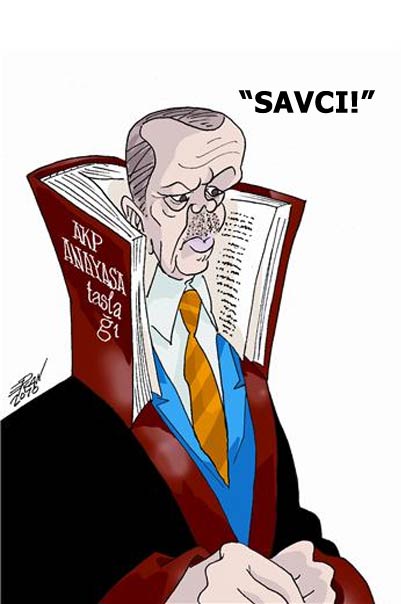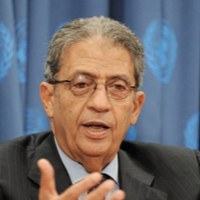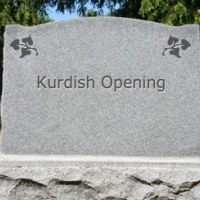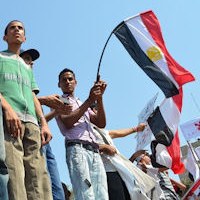![]()
Mon, Nov 08, 2010 | Turkey Analyst, vol. 3 no. 19 | By Gareth H. Jenkins
Changing Of The Guard: Judicial Reforms Reinforce Concerns About the AKP’s Increasing Authoritarianism
This article was first published in the Turkey Analyst (www.turkeyanalyst.org), a biweekly publication of the Central Asia-Caucasus Institute & Silk Road Studies Program Joint Center.
The restructuring of the Supreme Board of Judges and Prosecutors (HSYK), which is responsible for appointments and disciplinary procedures in the Turkish judicial system, was one of the key reforms in the package of constitutional amendments which were approved in a referendum on September 12, 2010. During the referendum campaign, the ruling Justice and Development Party (AKP) claimed that the restructuring of bodies such as the HSYK and the Constitutional Court were prerequisites for the establishment of what it termed an “independent judiciary”. The reformed HSYK held its first meeting on October 25, 2010. Yet both its composition and its initial decisions have reinforced, rather than allayed, growing concerns both about the politicization of judicial processes in Turkey and the increasing authoritarianism of the AKP.
Background:
Prior to the constitutional amendments of September 12, 2010, the HSYK consisted of seven members. Five were chosen by the president from candidates nominated from their own members by the Yargıtay (Supreme Court of Appeal) and Danıştay (Council of State). The other two were ex officio: the undersecretary of the Justice Ministry, and the justice minister, who also chaired HSYK meetings.
Around 4,000 of the nearly 10,500 judges and prosecutors in Turkey have been appointed since the moderate Islamist AKP first came to power in November 2002. However, before the referendum of September 12, 2010, all of the highest organs of the judiciary – including the HSYK, Constitutional Court, Yargıtay and Danıştay – were dominated by personnel who had worked their up through the system when a strict adherence to the hard-line secularism of the official ideology of Kemalism was a prerequisite for career advancement. The AKP and its supporters frequently complained that some of the decisions of the higher echelons of the judiciary were motivated more by ideological considerations than a desire to uphold Turkish law. Some of the criticisms were undoubtedly justified; not least with regard to the ultimately unsuccessful closure case brought against the AKP itself in 2008.
However, particularly since the AKP was reelected in a landslide in July 2007, there has been considerable evidence to suggest that AKP sympathizers, who are now themselves working their way up through the system, have been exploiting their growing influence for ideological purposes. Examples range from the numerous abuses and absurdities in the notorious Ergenekon investigation and the imprisonment on trumped-up charges of former police chief Hanefi Avcı to the massive tax fines levied on the Doğan Media group and the blatant reluctance to pursue apparently incontrovertible evidence of criminal activity by companies and individuals close to the AKP leadership; most strikingly in relation to the embezzlement of donations to the Germany-based Islamic charity Deniz Feneri. (See Turkey Analyst, 9/26/2008)
As a result, the AKP’s insistence that its constitutional amendments were motivated by the desire to create an independent judiciary motivated solely by respect for the rule of law was always going to be greeted with a degree of skepticism. Such doubts were reinforced by the AKP’s repeated declarations during the referendum campaign that the reforms had been demanded by the EU as part of the process of harmonization with European norms. This was disingenuous.
Under the changes approved in the September 12, 2010, referendum, the HSYK was expanded to 22 members, with 12 reserve members. The justice minister and undersecretary of the Justice Ministry retained their seats. The Yargıtay continued to choose three full members and the Danıştay two; in addition to three and two reserve members respectively. The Justice Academy chose one full and one reserve member, while the president appointed four full members. The remaining ten full and six reserve members were to be elected by the judges and prosecutors themselves.
The EU had, indeed, called for the HSYK to be representative of a broader cross-section of the judiciary. But it had explicitly stated that, as an elected politician, the justice minister should not be a member of the HSYK. Yet, under the AKP’s reforms, the justice minister not only continued to be a member of the HSYK but chaired all of its meetings and had veto power over any disciplinary proceedings against a judge or prosecutor.
Implications:
A total of 207 judges and prosecutors put themselves forward as candidates for election as one of the ten full and six reserve members of the HSYK. In the weeks leading up to the vote, the Justice Ministry quietly distributed a list of its 16 preferred candidates. The relatively large number of ballot boxes and an opaque voting process led to fears that the ministry would be able to identify who had voted for candidates not on its list. Privately, several prosecutors cited the example of İlhan Cihaner, the chief public prosecutor in Erzincan, who is currently facing charges of being a member of a terrorist organization after he uncovered evidence that suggested that AKP supporters were fixing state contracts. When the election was held on October 17, 2010, the 16 seats were duly filled by the ministry’s 16 chosen candidates, who won nearly two thirds of the votes.
The criteria used by the Justice Ministry in selecting its 16 candidates are unclear, although they appear to extend beyond mere professional competence. Three of the successful candidates were AKP-appointed bureaucrats. They included İbrahim Okur, the controverisal deputy undersecretary of the Justice Ministry who has been accused by hard-line secularists of being one of the driving forces behind the infamous Ergenekon investigation. Other members included Celal Avar and Harun Kodalak. A public prosecutor from Istanbul, Avar famously brought criminal charges against the administrators of a Turkish language website about atheism, demanding lengthy prison sentences on the grounds that the website was denigrating “religious values”. Kodalak is best known as being the prosecutor appointed to oversee the Deniz Feneri investigation; which, despite the irrefutable evidence of wrongdoing by individuals close to the AKP leadership, has nevertheless continued to be characterized by procrastination and inertia.
Concerns about the selection criteria were reinforced by the appointments announced by President Abdullah Gül on October 22, 2010. All four of the members named by Gül had reputations of being personally loyal to him. Two were from Gül’s home town of Kayseri. The latter included Ali Aydın, the head of the Kayseri Bar Association and the former deputy head of the Islamic human rights association MazlumDer.
The restructuring of the HSYK coincided with its relocation to a newly constructed building; together with substantial salary increases, and the provision of administrative staff and a brand new car for each member; benefits which had not been accorded to the previous members of the HSYK.
During the referendum campaign, the AKP had promised that, in order to preserve its institutional independence, the new HSYK would receive its own budget. However, in the new draft law that was presented to parliament by the AKP on October 28, 2010, this provision had been quietly omitted.
The restructured HSYK held its first meeting on October 25, 2010. It is still too early to assess the full impact of the changes in the board’s composition on the judicial system, but there are already indications of an ideological split between the members appointed by the Yargıtay and Danıştay and those regarded as being close to the AKP.
Under the amendments approved on September 12, 2010, a total of 15 members of the HSYK need to be present in order for the board to be quorate. Decisions are taken by a simple majority of the full membership of the board of 22, namely a minimum of 12 votes; which is also the total of the justice minister, the ministry undersecretary, and the ten members elected on the Justice Ministry list.
On November 6, 2010, a proposal by Ali Suat Ertosun, who was chosen by the Yargıtay, to reassign the prosecutors who are running the Ergenekon investigation was rejected by a majority of the 22 members of the HSYK. Similarly, despite objections by the members chosen by the Yargıtay and Danıştay, the HSYK voted to demote Cihaner, who remains free pending the conclusion of his trial, from chief public prosecutor to public prosecutor; and move him from Erzincan to Adana.
In the longer term, barring a change in government, even the objections of the HSYK members appointed by the Yargıtay and Danıştay are likely to cease; as it is the HSYK which is responsible for choosing the new members for each court once the terms of the incumbents expire.
CONCLUSIONS: The Turkish judicial system has long been in urgent need of a comprehensive overhaul. Cases frequently drag on for years. Corruption is widespread and standards of evidence and respect for due process often fall well below the minimum required in developed countries. It is also true that, as the AKP and its sympathizers complain, in the past legal processes were frequently colored by the ideology of the Kemalist elite who have traditionally dominated the higher echelons of the judiciary.
However, the AKP’s decision to attempt to reform only those judicial organs which were regarded as being ideologically opposed to the government immediately created the suspicion about its priorities; particularly when set in the context of the numerous abuses of due process and the politically motivated prosecutions of the AKP’s opponents by the government’s supporters and sympathizers in the lower echelons of the judicial apparatus.
The process through which the HSYK has been restructured has once again demonstrated the often alarming gap between the AKP’s rhetoric and reality. Far from depoliticizing the Turkish judicial system, the reform has merely accelerated the change in its ideological hue; and, in the process, reinforced already serious concerns about the AKP’s increasing authoritarianism.
© Central Asia-Caucasus Institute & Silk Road Studies Program Joint Center, 2010.
This article may be reprinted provided that the following sentence be included: “This article was first published in the Turkey Analyst (www.turkeyanalyst.org), a biweekly publication of the Central Asia-Caucasus Institute & Silk Road Studies Program Joint Center”.
The Turkey Analyst is a publication of the Central Asia-Caucasus Institute & Silk Road Studies Joint Center, designed to bring authoritative analysis and news on the rapidly developing domestic and foreign policy issues in Turkey. It is published bi-weekly, and includes topical analysis, as well as a summary of the Turkish media debate. It is edited and compiled under the supervision of Svante E. Cornell and Halil M. Karaveli.



 RSS
RSS












Changing of the Guard: Judicial Reforms Reinforce Concerns About the AKP's Increasing Authoritarianism | #AKP #Turkey http://j.mp/esS577
Changing Of The Guard: Judicial Reforms Reinforce Concerns About the AKP’s Increasing Authoritarianism http://j.mp/igdWBG #Turkey #Erdogan